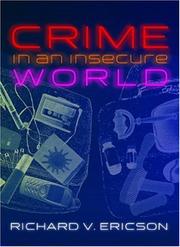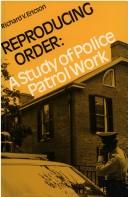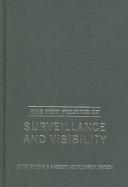| Listing 1 - 10 of 46 | << page >> |
Sort by
|

ISBN: 9780745638294 0745638295 Year: 2007 Publisher: Cambridge Polity
Abstract | Keywords | Export | Availability | Bookmark
 Loading...
Loading...Choose an application
- Reference Manager
- EndNote
- RefWorks (Direct export to RefWorks)
This new book by Richard Ericson explores the alarming trend across Western societies of treating every imaginable source of harm as a crime. It locates this trend in the 21st century obsession with insecurity fostered by neo-liberal governments. It is grounded in leading-edge theory and research across academic disciplines.
Crime --- Security (Psychology) --- Crime prevention --- Fear of crime --- Government policy --- Crime - Government policy
Book
ISBN: 0387904425 Year: 1979 Publisher: Washington
Abstract | Keywords | Export | Availability | Bookmark
 Loading...
Loading...Choose an application
- Reference Manager
- EndNote
- RefWorks (Direct export to RefWorks)
Book
ISBN: 1855214334 Year: 1995 Publisher: Aldershot : Dartmouth,
Abstract | Keywords | Export | Availability | Bookmark
 Loading...
Loading...Choose an application
- Reference Manager
- EndNote
- RefWorks (Direct export to RefWorks)
Crime in mass media --- Crime and the press --- Criminalité dans les médias --- Criminalité et presse --- Crime reporting (Journalism) --- Press and crime --- Trial reporting --- Trials in the press --- Press --- Free press and fair trial --- Crime and criminals in mass media --- Mass media --- Crime and the press. --- Crime in mass media. --- Crime --- Trials --- Press coverage --- Criminalité dans les médias --- Criminalité et presse
Book
ISBN: 0409829250 9780409829259 Year: 1981 Publisher: Toronto Butterworth
Abstract | Keywords | Export | Availability | Bookmark
 Loading...
Loading...Choose an application
- Reference Manager
- EndNote
- RefWorks (Direct export to RefWorks)
343.9 --- Criminologie --(algemeen) --- 343.9 Criminologie --(algemeen)
Book
ISBN: 0470559896 1119204100 9786612688270 0470616105 1282688278 9780470616109 9781119204107 9780470559895 9781282688278 0470616121 Year: 2010 Publisher: Hoboken, N.J. : Wiley,
Abstract | Keywords | Export | Availability | Bookmark
 Loading...
Loading...Choose an application
- Reference Manager
- EndNote
- RefWorks (Direct export to RefWorks)
Make the most of the new standards Every year companies spend millions of dollars on executive incentives. All too often, however, these programs provide a very weak link between pay and performance, with executives potentially rewarded as much for bad decisions as they are for good ones. Packed with examples, The New Standards insightfully discusses: How to link pay with business results that create long-term value Why incentive structures can discourage management from reasonable risk-taking, in some cases, and can enocourage imprudent risks in others
Chief executive officers - Salaries, etc. --- Chief executive officers -- Salaries, etc. --- Employee motivation. --- Executives - Salaries, etc. --- Executives -- Salaries, etc. --- Incentives in industry. --- Stock options. --- Incentives in industry --- Executives --- Chief executive officers --- Stock options --- Employee motivation --- Commerce --- Business & Economics --- Marketing & Sales --- Salaries, etc --- Salaries, etc. --- Motivation in industry --- Work motivation --- Options, Stock --- CEOs (Executives) --- Executive officers, Chief --- Executive compensation --- Employee incentives --- Labor incentives --- Salaries, pensions, etc. --- Motivation (Psychology) --- Personnel management --- Psychology, Industrial --- Goal setting in personnel management --- Options (Finance) --- Employee competitive behavior --- Employee morale --- E-books

ISBN: 0802064752 9786612056086 1282056085 1442679247 9781442679245 0802055699 9780802064752 9780802055699 Year: 1982 Publisher: Toronto University of Toronto
Abstract | Keywords | Export | Availability | Bookmark
 Loading...
Loading...Choose an application
- Reference Manager
- EndNote
- RefWorks (Direct export to RefWorks)
Professor Ericson and his colleagues followed the work of patrol officers in a large Canadian regional police force. From their direct observations comes a wealth of information, quantitatively assembled and qualitatively discussed, with insights into the nature of policing.This book reveals that the police are not mere 'referees' of our legal lives, blowing the whistle on our infractions. They are censors of certain types of possibly wrong actions. They are selective in their invocation of criminal law and use the law artfully to restore settings to orderliness.Ericson emphasizes the routine manner in which the patrol officer intervenes and gains compliance fron the citizenry. He demonstrates that when the criminal process is invoked, the police maintain fundamental control over the court outcome.Using these findings, he addresses basic questions about the role of police in relation to crime and how it is produced, literally, by the patrol officer. Crime is also seen as the primary basis of police legitimacy, which in turn enables the police to engage in broad surveillance and information-gathering.The author's conclusions about the nature of policing and his discussion of the implications of proposals for reform of police, will generate better-informed deliberation in political and public decision-making and in the general study of sociological theory.
343.9 --- 343.9 Criminologie --(algemeen) --- Criminologie --(algemeen) --- Police patrol --- Police --- Case studies --- Police patrol - Canada --- Police patrol - Canada - Case studies --- Canada. --- Canada (Province) --- Canadae --- Ceanada --- Chanada --- Chanadey --- Dominio del Canadá --- Dominion of Canada --- Jianada --- Kʻaenada --- Kaineḍā --- Kanada --- Ḳanadah --- Kanadaja --- Kanadas --- Ḳanade --- Kanado --- Kanakā --- Province of Canada --- Republica de Canadá --- Yn Chanadey

ISBN: 1282033999 9786612033995 1442681888 9781442681880 9781282033993 0802038298 9780802038296 0802048781 9780802048783 Year: 2006 Publisher: Toronto
Abstract | Keywords | Export | Availability | Bookmark
 Loading...
Loading...Choose an application
- Reference Manager
- EndNote
- RefWorks (Direct export to RefWorks)
This collection challenges conventional wisdom and advances new theoretical approaches through a series of studies of surveillance in policing, the military, commercial enterprises, mass media, and health sciences.
Electronic surveillance --- Privacy, Right of. --- Social control. --- Social conflict --- Sociology --- Liberty --- Pressure groups --- Invasion of privacy --- Privacy, Right of --- Right of privacy --- Civil rights --- Libel and slander --- Personality (Law) --- Press law --- Computer crimes --- Confidential communications --- Data protection --- Right to be forgotten --- Secrecy --- Social aspects. --- Law and legislation
Book
ISBN: 1282040030 9786612040030 1442678119 9781442678118 9780802024510 0802024513 9780802064639 0802024513 0802064639 9781282040038 1442638532 Year: 1989 Publisher: Toronto
Abstract | Keywords | Export | Availability | Bookmark
 Loading...
Loading...Choose an application
- Reference Manager
- EndNote
- RefWorks (Direct export to RefWorks)
From the point of his arrest through to the final disposition of his case, the authors follow the accused as he proceeds through the criminal control system. They draw a picture of one who is dependent upon the orders and decisions of the police, crown attorney, defence lawyer, and judge and not a defendant with significant autonomy. Substudies conducted under a program of the Centre of Criminology provide empirical material on patrol police, detectives, crown attorneys and defence lawyers and are complemented by the authors? own interviews of accused persons. They produce a unique picture of the person who stands accused: unlike the official agents who are regular and experienced participants in the criminal process, the accused is a ?one-shot? player.As a dependant he is subject to the orders and decisions of the official criminal control agents; he fails to exercise what appear externally as his formal rights because the apparent costs exceed the advantages. He complies with police searches, fails to remain silent, fails to call a third party, gives a statement, often does not obtain a lawyer, routinely accepts his lawyer?s advice, rarely demands a trial, often remains silent in court, and very rarely considers an appeal. The ordering which the accused meets out of court is reproduced in the public forum of the court. Through the display of formal legal rationality there and in the belief that matters ?could have been a lot worse,? he experiences the ?majesty, justice, and mercy? of the criminal process and, in turn, accords legitimacy to the actions taken against him. The authors discuss prospects for changing the criminal process and conclude that the range of reforms that have been advocated, and sometimes implemented, does not lead to an alteration of the accused?s position within the ordering of justice because the system is not truly adversarial. Rather, it serves the interests of the state in ordering the population as well as professional interests of those who man the system.
Criminal procedure --- Criminal justice, Administration of --- Pleas (Criminal procedure) --- Crime --- Guilt (Law) --- Pleading --- Peine forte et dure --- Canada. --- Canada (Province) --- Canadae --- Ceanada --- Chanada --- Chanadey --- Dominio del Canad --- Dominion of Canada --- Jianada --- Kʻaenada --- Kanada --- Ḳanadah --- Kanadaja --- Kanadas --- Ḳanade --- Kanado --- Kanak --- Province of Canada --- Republica de Canad --- Yn Chanadey --- Dominio del Canadá --- Kaineḍā --- Kanakā --- Republica de Canadá
Book
Year: 1975 Publisher: Westmead: Saxon house,
Abstract | Keywords | Export | Availability | Bookmark
 Loading...
Loading...Choose an application
- Reference Manager
- EndNote
- RefWorks (Direct export to RefWorks)
Book
Year: 1975 Publisher: Westmead: Saxon house,
Abstract | Keywords | Export | Availability | Bookmark
 Loading...
Loading...Choose an application
- Reference Manager
- EndNote
- RefWorks (Direct export to RefWorks)
| Listing 1 - 10 of 46 | << page >> |
Sort by
|

 Search
Search Feedback
Feedback About UniCat
About UniCat  Help
Help News
News